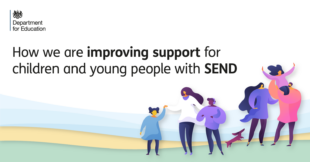
We want all children and young people to have the same opportunity to meet their potential – including children and young people with special educational needs and disabilities (SEND).
Our ambitious new plan will create consistent, high standards of support for families no matter where in the country they live.
Here’s what you need to know.
How will children with SEND benefit from this additional support?
Every child is unique and deserves support that meets their needs – never more so than in the developmental years.
Some councils and local areas do an incredible job of this, but it’s not the same for everyone, with families in some areas facing a daily battle fighting the system for their children’s needs.
This new plan hopes to change that. We’re making sure we deliver the funding and school places that are needed.
For those children who will have the best experience in a mainstream school, we’re increasing additional ‘high needs’ funding, on top of the core school budget, to over £10 billion by 24/25.
We’re also building 33 new special free schools for children who need more intensive support.
Will there be more training for teachers?
Under the new plans there will be further training for staff, ranging from up to 5,000 early years special educational needs coordinators to 400 educational psychologists, covering a wide range of educational needs.
The Institute for Apprenticeships and Technical Education will also develop an apprenticeship for teachers of sensory impairments, such as deafness and blindness.
Will there be more support for families with children with SEND?
Yes. We will be developing new approaches for short breaks for children and young people with complex needs and their families, providing important respite for families.
This will help local areas to test new services including play, sports, arts and independent living activities, allowing parents time to themselves while their child enjoys learning new skills.
New national standards will also make clear to parents, schools, local authorities, and other providers what support should be offered at every stage of a child’s journey across education, health and care.
The plan will improve parents’ and carers’ experiences of accessing support, with a digital-first process for obtaining Education Health and Care Plans (EHCP) where they are needed.